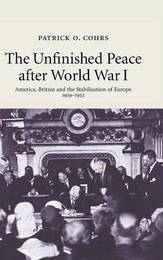
|
The Unfinished Peace after World War I: America, Britain and the Stabilisation of Europe, 1919-1932
Hardback
Main Details
Description
This is a highly original and revisionist analysis of British and American efforts to forge a stable Euro-Atlantic peace order between 1919 and the rise of Hitler. Patrick Cohrs argues that this order was not founded at Versailles but rather through the first 'real' peace settlements after World War I - the London reparations settlement of 1924 and the Locarno security pact of 1925. Crucially, both fostered Germany's integration into a fledgling transatlantic peace system, thus laying the only realistic foundations for European stability. What proved decisive was that key decision-makers drew lessons from the 'Great War' and Versailles' shortcomings. Yet Cohrs also re-appraises why they could not sustain the new order, master its gravest crisis - the Great Depression - and prevent Nazism's onslaught. Despite this ultimate failure, he concludes that the 'unfinished peace' of the 1920s prefigured the terms on which a more durable peace could be founded after 1945.
Author Biography
Patrick O. Cohrs is assistant professor of history at Yale University. Professor Cohrs received his doctorate from the University of Oxford in 2002. He has held fellowships at the Center for European Studies and the Belfer Center for Science and International Affairs at Harvard University. Before coming to Yale, he was the Alistair Horne Fellow at St Antony's College, Oxford, and taught as assistant professor at Humboldt University Berlin.
Reviews'This is a highly original and thought-provoking book. Patrick Cohrs, adopting a systemic approach to his subject, argues that the Anglo-American agreements of 1923-5 laid the foundations for a stable peace in Europe and inaugurated an American-dominated Euro-Atlantic system that lasted until it was disrupted by the unprecedented world depression. ... Cohrs' challenging thesis forces one to reconsider the process of European stabilisation in the 1920s, and to reassess the nature of the American contribution to its limited success.' Zara Steiner, English Historical Review 'In this opus magnum the author has re-examined extensive archival holdings and private papers and ... with an assured grasp of his subject provided an original interpretation ...' Werner Link, Historische Zeitschrift ' ... as well as making a significant contribution to the scholarly debate about the 1920s, Cohrs' book also serves as a useful reminder of the difficulties that attend peacemaking, and the long-term commitment that is required to make it succeed.' Times Literary Supplement 'Patrick O. Cohrs offers a major reinterpretation of post-World War I international history... Much of the best scholarship on [this period] focuses on either European or transatlantic relations. To his credit, Cohrs combines both in his study of the Euro-Atlantic order. He places Locarno diplomacy of 1925-1929 - the new European concert - within a transatlantic framework.' American Historical Review 'Cohrs convincingly argues that we are wrong to view the 1920s as a decade of false dawns simply preordaining a decade when much worse was to follow. The book is especially important because a study that includes the American dimension to what many scholars have tended to view exclusively from a European perspective is long overdue.' History ' ... a masterpiece of research and one that should significantly change the way we see the inter war period ...' Journal of British Studies '... Patrick O. Cohrs has contributed a mammoth study ... In this fine revisionist work, Cohrs argues that European and American policy-makers ... were able to create a viable transatlantic international order in the 1920s, which constituted an important accomplishment in the history of international relations and was not inexorably doomed to fail.' Peace and Change 'Patrick Cohrs' The Unfinished Peace after World War I brilliantly renews the genre of classic international history. Based on massive archival scholarship and elegantly written, his study focuses on American and British roles and asks why a stable European security system could not be consolidated between the Versailles Treaty and the advent of Hitler. Ultimately, he argues, it fell to London and Washington to help Paris and Berlin overcome distrust, nationalism, and impatience with the slow pace of mutual concessions. High stakes, alas, could not guarantee success, but failure was not foreordained. There are important lessons here for the Middle East and other regional conflicts. In the end there are no outsiders.' Charles S. Maier, Leverett Saltonstall Professor of History, Harvard University
|